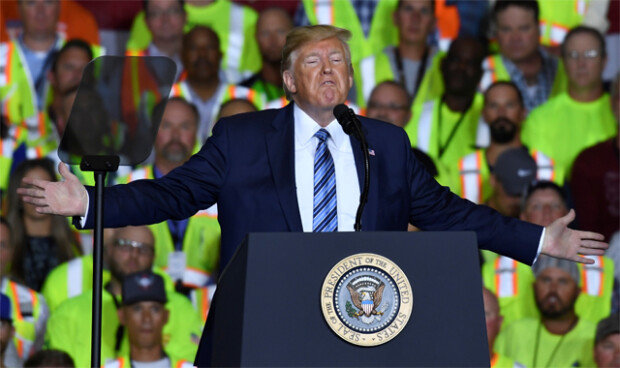Trump delays China tariffs due to Christmas shopping season
Trump delays China tariffs due to Christmas shopping season
Posted August. 15, 2019 07:34,
Updated August. 15, 2019 07:34

U.S. President Donald Trump announced Tuesday that he will “delay China tariffs to avoid U.S. shoppers’ impact on the Christmas shopping season.” This is a shift to his stance 12 days ago to “impose 10% tariffs on Chinese goods worth 300 billion dollars starting on September 1st”.
The US Trade Representative also posted an announcement on its website that it will delay tariffs on Chinese smartphones, lap top computers, toys, video games, etc. to Dec 15. The Chinese Ministry of Commerce announced that Chinese Vice Premier Liu He spoke on the phone with Secretary Steven Mnuchin and Trade Representative Robert Lighthizer and agreed to speak again two weeks later.
The Wall Street Journal estimated that the total amount of tariffs that would be delayed amount to around 156 billion U.S. dollars, based on trade value as of 2018. Additional tariffs to be imposed on iPhones manufactured in China, in particular, are predicted to be delayed as well. Meanwhile, tariffs on tools, apparel, certain shoes and other goods worth 107 billion dollars are likely to be imposed starting on September 1.
The Thanksgiving shopping holidays known as “Black Friday” and the Christmas season at the end of the year is the biggest shopping event that determines the U.S. retail business. It is a critical period that would impact the Trump administration’s efforts to run for presidency again next year. “Trump finally acknowledges that tariffs could hit U.S. consumers. An American family of four would have to pay more about 350 dollars a year if the full cost of tariffs was passed to consumers,” reported the Washington Post. The newspaper also stated that “U.S. importers argued to the U.S. administration that the cost of tariffs would be passed on to consumers.”
News of favorable trade negotiations helped boost the Dow and NASDAQ index by 1.44% and 1.95% respectively. Apple stock prices also rose 4.23%. On Wednesday, the KOSPI started off with more than 1% growth and closed at 1,938.37, which is a 0.65% increase from the previous day. The KOSDAQ also recovered the 600 mark and closed at 597.15, up 1.08% from the previous day.
However, experts say that the tariff delay is unlikely to become a breakthrough to U.S.-China trade negotiations. Wall Street insiders say that the outcome had only exposed weaknesses of the U.S., giving China more negotiating power. The U.S. is notedly preparing for face to face negotiations with China in Washington D.C. next month. The trade deadlock is unlikely to be addressed unless China agrees to reforms on unfair industrial subsidies and theft of intellectual property.
Yong Park parky@donga.com · Gun-Huk Lee gun@donga.com







